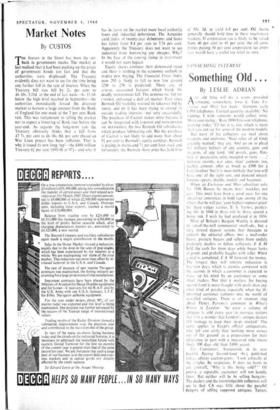Market Notes
By CUSTOS
THE feature in the Street has been the set- back in government stocks. The market at last realised that it had been pushing up the prices of government bonds too fast and that the authorities were displeased. The Treasury evidently does not want to see for the time being any further fall in the rate of interest. When the Treasury bill rate fell by 2s. per cent to £6 10s. 3.21d. at the end of last week-4s. 11.3d. below the high level reached in September—the authorities immediately forced the discount market to borrow a large amount from the Bank of England for one week at the 7 per cent Bank rate. This was tantamount to telling the market not to expect a lowering of Bank rate before the year-end. As regards the long-term rate the Treasury obviously thinks that a fall from 17 7s. per cent to £6 18s. Od. per cent (based on War Loan prices) has been sufficient. That is why it issued its new long `tap'—the £400 million Treasury 63 per cent 1995-98 at 971— and why it has let loose on the market more local authority loans and industrial debentures. The Actuaries yield index of twenty-year debentures and loans has fallen from 8.4 per cent to 7.74 per cent. Apparently the Treasury does not want to see industrial firms borrowing any cheaper. Why? In the face of the coming slump in investment it would not seem logical.
Equity shares continue their downward trend and there is nothing in the economic outlook to inspire new buying. The Financial Times index now 293 is likely to fall to new low ground (250 to 270 is predicted). There are, of course, occasional features which break the deadly monotonous fall. The BURMAH OIL bid for CASTROL enlivened a dull oil market. Ever since Burmah Oil foolishly resisted its takeover bid by SHELL and BP it has been trying to extend its outside trading interests—not very successfully. The purchase of Castrol makes sense because it can be integrated with LOBITOS and MANCHESTER OIL REFINERIES, the two Burmah Oil subsidiaries which produce lubricating oils. But the purchase of Castro] is not likely to add more than about 91 per cent to Burmah's equity earnings. Burmah is paying in shares and 71 per cent loan stock and fortunately the Burmah share price has held firm at 53s. 3d. to yield 6.3 per cent. Oil shares 1r generally should hold firm in these reactionary markets. If corporation tax is likely to be raised from 40 per cent to 45 per cent, the oil com- panies paying 50 per cent corporation tax over- seas would have a useful tax relief in store.


































 Previous page
Previous page